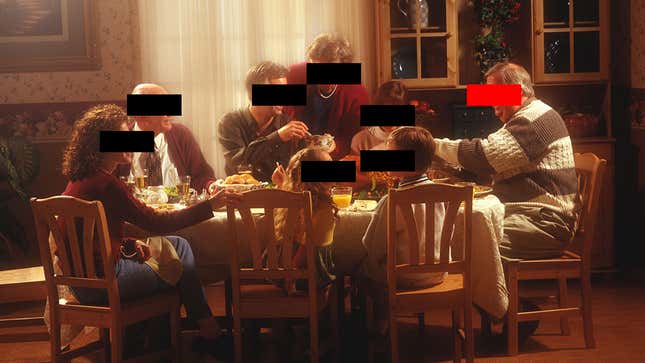Forced to Dine With a Racist Uncle on Thanksgiving? Text This Holiday Hotline


If you need help preparing your turkey for the holidays, you can call the Butterball hotline for advice from professionally trained turkey experts. And if you need help dealing with your blatantly racist white family members sitting around the holiday table, there’s a hotline for advice from professionally trained anti-racists.
The SURJ Holiday Mobile Hotline is a free texting service brought to you by the folks at Showing Up for Racial Justice (SURJ), a national network of white people who want to undermine white support for white supremacy. It’s a “choose your own adventure” game in which you select a topic and are then connected to a library of talking points to help you win over your controversial white loved ones.
Start by texting SOS to 82623, and you’ll immediately get a reply with a list of topics racists often love to bring up with progressive family members. The hotline will prompt you with talking points and links to guides for how to talk about issues like immigration and DACA, national anthem protests, the origins of Thanksgiving, and how to deal with “Trump isn’t racist” comments.
“Racism exists because white folks avoid these conversations,” says Heather Cronk, a co-director for SURJ, who grew up in Kentucky. Cronk, who often talks it out with her own parents, is well aware that these issues are tough to navigate and that they often require love, diligence, and patience so both sides feel like there’s a mutual level of respect. (“These conversations are tricky, and often get ‘in the weeds’ fast,” the SURJ website warns.)
“I believe my family and friends are worth fighting for to be anti-racists,” Cronk says. “I really believe in their ability to change.”
To avoid your phone becoming a distraction, Cronk recommends texting the hotline with your device under the table or excusing yourself while you text for help navigating these conversations.
SURJ also created an anti-racist placemat you can print and set under your plate if you want to avoid grabbing your cell phone. The placemat focuses on indigenous solidarity and challenging familiar narratives about Thanksgiving, but it also includes some universal tips to keep you centered regardless of the argument. The tips for talking with family members include reminders to listen, breathe, speak from a place of mutual interests, and “affirm, but clarify, the difference between good intentions and harmful impact.” The hope is that the guides can help you move forward and avoid conversational shutdowns.
The talking points and guides have been tried and tested across the country by white people in SURJ workshops. SURJ has 180 chapters and affiliates across the country, including some in really white places like Lincoln, Nebraska and Billings, Montana. This is the second year SURJ has made the texting hotline available.
Cronk says it’s crucial to challenge racists comments even when you think someone is a lost cause.
“Every time we avoid these conversations we give permission to folks to continue believing or making racist statements,” Cronk says. “Maybe you’re not going to convince your racist uncle in one dinner conversation,”—it may necessitate several Thanksgiving discussions—“but everybody else at that table is also listening.”
It’s especially important to challenge these comments when there are children around. Multiple studies indicate that children pick up on racism early. Harvard researchers found children as young as three years old can emulate racist behavior.
But there’s hope, because studies have also found racial biases can be unlearned.
“There are really high stakes for us having these conversations,” Cronk says.
SURJ is mostly framing the hotline in terms of white people, but the talking points are relevant to racists of any color. For instance, people of color can take issue with athletes protesting during the national anthem. The hotline advises that a person solicits feedback by saying, “I understand you might think it is a distraction, but I think it’s really powerful. Have you seen athletes use their platforms in inspiring ways?”
If these initial tactics don’t work, the hotline also links you to SURJ’s website, which has more in-depth guides.
If your relative shoots back by saying that kneeling during the National Anthem is disrespectful to veterans and harmful to America, SURJ has a response at the ready: “Colin Kaepernick has shared that he is not standing [during the national anthem] because of the US flag, pledge, and anthem symbolize things like police brutality and racism. His actions are not related to veterans,” the guide notes. “In fact, he said that he sees the treatment of veterans in the US as part of the problem he’s protesting.”
Text SOS to 82623 for help with your racist loved ones. (And if you’re into emoticons, you can also just text to 82623.)